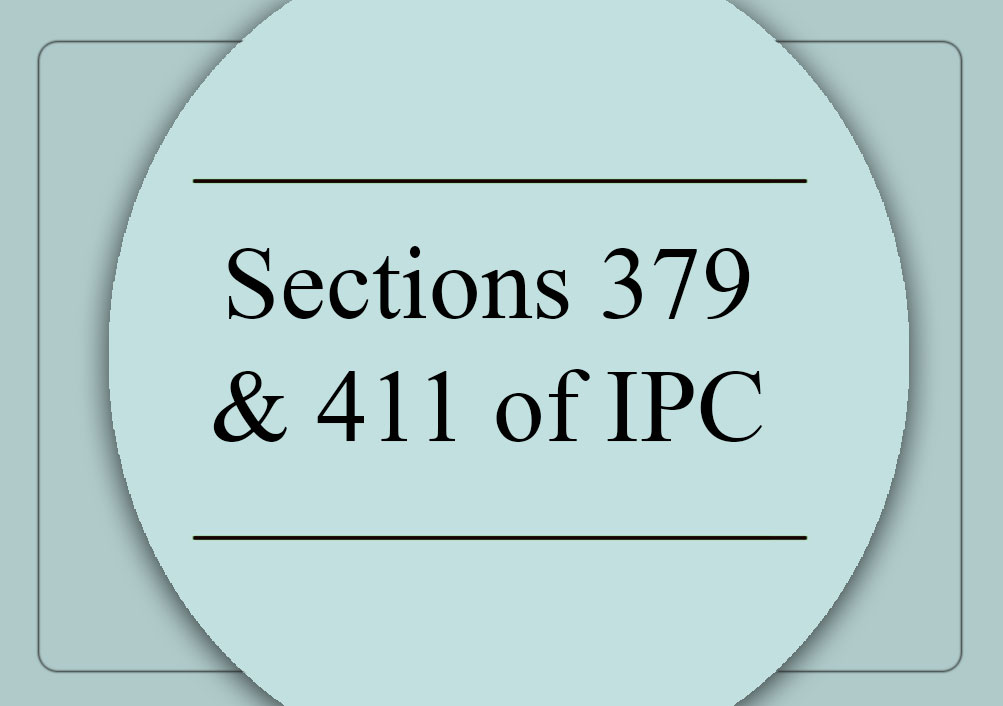Case Laws: Can a person be held guilty for commission of offences under both sections 379 and 411 of the IPC?

1. Sunil Mashi@ Silly v. State Nct Of Delhi1
(High Court of Delhi) | 14-10-2014
In this case, High court of Delhi observed that appellant was rightly convicted under Section 379 IPC, however, the learned Trial Court has convicted the appellant for offence under Section-411 IPC as well. Keeping in view the fact that he has been convicted under Section- 379 IPC, there was no justification for convicting him for offence under Section-411 IPC. As such, his conviction under Section-411 is set aside.
Relevant Para is as follows:-
“42. Even as regards offence under Section 379 IPC, the appellant was rightly convicted inasmuch as he was found in possession of the stolen articles immediately after the commission of theft and, therefore, the presumption under Section 114-A of Indian Evidence Act, 1872 arises against him.
43. Hon’ble Supreme Court in Ganesh Lal v. State of Rajasthan, (2002) 1 SCC 731 elaborately discussed regarding the presumption laid down under Section 114 Evidence Act:
“12. Section 114 of the Evidence Act provides that the Court may presume the existence of any fact which it thinks likely to have happened, regard being had to the common course of natural events, human conduct and public private business, in their relation to facts of the particular case. Illustration (a) provides that a man who is in possession of stolen goods soon after the theft may be presumed by the Court to be either the thief or one who has received the goods knowing them to be stolen, unless he can account for his possession. The presumption so raised is one of fact rather than of law. In the facts and circumstances of a given case relying on the strength of the presumption the Court may dispense with direct proof of certain such facts as can be safely presumed to be necessarily existing by applying the logic and wisdom underlying Section 114. Where offences, more than one, have taken place as part of one transaction, recent and unexplained possession of property belonging to deceased may enable a presumption being raised against the accused that he is guilty not only of the offence of theft or dacoity but also of other offences forming part of that transaction.”
44. As such, the appellant was rightly convicted under Section 379 IPC, however, the learned Trial Court has convicted the appellant for offence under Section-411 IPC as well. Keeping in view the fact that he has been convicted under Section-379 IPC, there was no justification for convicting him for offence under Section-411 IPC. As such, his conviction under Section-411 is set aside.”
2. Amita Ghosh & Another v. State Of Tripura2
(High Court of Gauhati) | 08-06-2012
In this case, it was observed by the court that the charge under section 411 cannot be brought against a person who himself has been held for commission of theft which is punishable under Section 379 of the IPC as in the definition of theft, it has been provided that whoever intending to take dishonestly any movable property out of the possession of any person without that persons consent moves that property in order to take such taking is said to commit theft. The word taking is also includes a retention.
Relevant Para is as follows:-
“(10) No effort was taken by the defence to lead evidence how the GI pipes were found in the house of the convict herein. The officers of the BSNL, PW-1, PW-4 and PW-6 identified those pipes as the stolen pipes. From the oral testimony of the PWs. 1, 3, 4, 5 and 6 involvement of the convict herein along with two other accomplices were well established as the prosecution failed to explain how the stolen pipes were found in his house. Accordingly, the presumption would be that he has stolen those pipes along with the co-accused. But the charge as sustained by the learned appellate Court under Section 411 of the IPC is over lapping inasmuch as Section 411 of the IPC speaks of an offence as under:
“whoever dishonestly receives or retains any stolen property, knowing or having reason to believe the same to be stolen property, shall be punished with imprisonment of either description for a term which may extend to three years, or with fine, or with both. “
(11) This charge cannot be brought against a person who himself has been held for commission of theft which is punishable under Section 379 of the IPC.
(12) In the definition of theft, it has been provided that whoever intending to take dishonestly any movable property out of the possession of any person without that persons consent moves that property in order to take such taking is said to commit theft. The word taking is also includes a retention.
(13) In the case in hand, there is no direct evidence against the petitioner but recovery of the stolen materials from his custody had established his involvement in the commission of theft and he has been rightly convicted under Section 379 of the IPC. Therefore, no interference for conviction under that Section is required. However, for the reasons as stated, the conviction as returned under Section 411 of the IPC is set aside.”
3. Gopi Jaiswal v. State Of Uttar Pradesh3
(High Court of Judicature at Allahabad) | 08-11-2011
In this case, it was held by High court of Allahabad that in view of the fact that the appellant Gopi Jaiswal was the real thief, his conviction could only be made under Section 379 IPC. His conviction under Section 411 IPC, in such situation, was not proper. A real thief cannot be a receiver of a stolen property.
Relevant Para is as follows:-
“In view of the fact that the appellant Gopi Jaiswal was the real thief, his conviction could only be made under Section 379 IPC. His conviction under Section 411 IPC, in such situation, was not proper. A real thief cannot be a receiver of a stolen property. If a person is the real thief and the stolen property is also recovered from his possession, he should be convicted and sentenced for the offence of theft and as such he cannot be convicted and sentenced under Section 411 IPC. Therefore, the order of conviction and sentence passed against the appellant under Section 411 IPC cannot be upheld. On the point of sentence, it may be mentioned that the occurrence is of the year 1992 and since then more than 19 years have elapsed and the appellant had no criminal antecedent prior to the incident. Moreso, there was nothing to show that he committed any crime after the incident. In view of the fact and circumstances of the case and antecedents of the appellant, the sentence of only three years rigorous imprisonment under Section 328 IPC would serve the ends of justice. The other sentences require no modification. The appeal is partly allowed. The conviction of the appellant under Sections 328 and 379 IPC is confirmed. However, the sentence of five years rigorous imprisonment passed against the appellant under Section 328 IPC is reduced to three years rigorous imprisonment. The sentence under Section 379 IPC is approved. The order of conviction and sentence passed against the appellant under Section 411 IPC is set aside. Let a copy of this judgment alongwith the lower Courts record be transmitted forthwith to the learned trial Court for immediate compliance.”
1 https://www.legitquest.com/case/sunil-mashi-silly-v-state-nct-of-delhi/8BE6D
2 https://www.legitquest.com/case/amita-ghosh–another-v-state-of-tripura/88883
3 https://www.legitquest.com/case/gopi-jaiswal-v-state-of-uttar-pradesh/CB7B0
Sign up for our weekly newsletter to stay up to date on our product, events featured blog, special offer and all of the exciting things that take place here at Legitquest.




Add a Comment